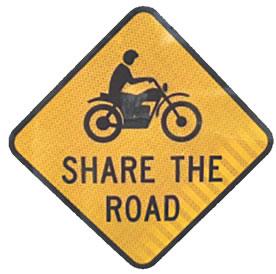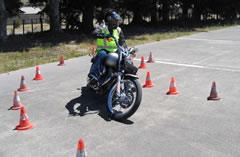 Grant funding totaling $97,730 has been awarded to the Georgia Motorcycle Safety Program (GMSP) by the Governor’s Office of Highway Safety (GOHS). The approved funding will be used to increase motorcycle safety awareness and outreach by encouraging all motorists and motorcyclists to Share the Road.
Grant funding totaling $97,730 has been awarded to the Georgia Motorcycle Safety Program (GMSP) by the Governor’s Office of Highway Safety (GOHS). The approved funding will be used to increase motorcycle safety awareness and outreach by encouraging all motorists and motorcyclists to Share the Road.
“I am pleased that DDS and GMSP can further our efforts to educate and encourage all Georgia drivers to Share the Road,” said DDS Commissioner Bert Brantley. “As riders and non-riders alike enjoy Georgia’s scenic roadways, it is imperative that we obey all traffic laws to remain safe.”
The grant allows DDS to further develop the Motorcycle Safety Outreach Program to promote State and national safety initiatives. The Outreach Coordinator researches, coordinates and helps maintain an adequate presence at industry events, local schools, regional meetings, and festivals to increase awareness of motorcycles on the roadways and provide the most current information on motorcycle safety initiatives. Visitors to the event display are also encouraged to sign up for monthly emails which provide additional safety information, as well as review the motorcycle safety message on other social media platforms.
 The Georgia Motorcycle Safety Program offers motorcycle training for new riders, as well as seasoned riders, who want to learn how to ride a motorcycle legally and safely. The Program is based on a continuum of learning and therefore offers three entry points to rider education. Students participating in the Basic Riders Course (BRC) do not need specialized motorcycle equipment, as the GMSP provides both a motorcycle and a helmet to class participants. Upon successful completion of the BRC, participants receive a 90-day license waiver card that exempts them from both the written and on-cycle skills tests needed to obtain a Class M license in the state of Georgia.
The Georgia Motorcycle Safety Program offers motorcycle training for new riders, as well as seasoned riders, who want to learn how to ride a motorcycle legally and safely. The Program is based on a continuum of learning and therefore offers three entry points to rider education. Students participating in the Basic Riders Course (BRC) do not need specialized motorcycle equipment, as the GMSP provides both a motorcycle and a helmet to class participants. Upon successful completion of the BRC, participants receive a 90-day license waiver card that exempts them from both the written and on-cycle skills tests needed to obtain a Class M license in the state of Georgia.
Tom Komjathy, GMSP Manager said, “Riding skills are perishable, and riders must acquire and practice good riding skills. The GMSP in cooperation with the Motorcycle Safety Foundation recommend courses for sequential, ongoing lifelong learning such as the Basic Rider Course 2 (BRC2) and the Advanced Rider Course (ARC).”
The Basic Rider Course 2 (BRC2) fine-tunes the experienced riders mental/Operational skills needed for survival in traffic, and the Advanced Rider’s Course (ARC), focuses on the complex skills of self-assessment and personal risk management. Both the BRC2 and the ARC require participants to provide their own motorcycle and equipment.
SOURCE: Tifton Gazette
November 21, 2016- -
-
1 likes this
- -
-
Report